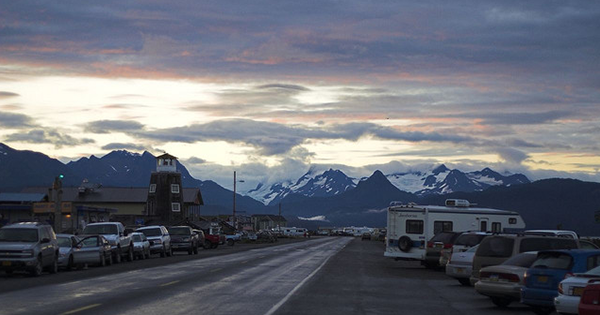
It’s just past the fall equinox, which means that in Homer, Alaska, we’re losing five minutes of light each day. You can’t feel it in a day, but in a week you go from waking up in light to waking up in darkness. It is the time of year when dark skies begin to press against us, and a familiar panic sets in: we will continue to lose light for the next three months.
The DJs on the local public radio station used to announce the number of minutes of light that were disappearing each day, the way stations elsewhere give a traffic report. But local people complained that it was too depressing to hear it spelled out like that. So the DJs stopped.
When I moved to Alaska sight unseen in 1999, I had no idea how the light would wax and wane so dramatically throughout the course of a year. There was a lot I didn’t know.
Going to Alaska had been a childhood dream. I was interested in the place because it was a state with an identity. The Maryland suburbs where I grew up seemed like a placeless place, known for what they were close to, not what they were. I chose Alaska as the subject of a report I wrote in the fifth grade. In it, I imagined traveling by ferry to visit. I would fish off the side of the ship, I wrote. I would meet an Eskimo onboard.
At age 24, the trip I had imagined when I was a kid came at least partially to fruition. I moved by ferry to Homer, a small fishing and tourism town on the edge of a 40-mile-long bay. Homer is at the end of the highway south from Anchorage and, even though it’s a four-hour drive, residents here often make the trek to the state’s largest city for back-to-school shopping and Costco runs.
A man I’d fallen for soon after graduating from college met me as I walked off the ship with a bag in each arm. The relationship did not last. But my affair with Alaska did. Now, 16 years later, I’m married to another man and have two daughters aged five and three. We live six miles away from the cabin with no running water where I first stayed when I moved here.
I arrived in Alaska in September, so the darkening time of year is the beginning of things for me here. And now, after a fiercely brief summer, during which the world out our windows flashed to life before dying back, the clock has once again reset itself. But that rotty wet leaf smell I associate with autumn where I grew up won’t tinge the air here until spring. And when spring finally arrives, it will come to us quietly. We’ll have to go looking for it. These are things I’ve come to know.
There are so many other things I didn’t know before I arrived: the difference between a seiner and a longliner, how the strength of the tides shifts over the course of the month, and how to bait a circle hook. And I didn’t know that Alaska could come to mean so much: our last wilderness, the gateway to an ever-more-accessible Arctic, and ground zero for the rabid effects of climate change.
I’ll be posting a weekly letter from Homer that I hope will capture something of what it’s like to live here and what it’s like to have this place as the vantage point from which to see the rest of the world.

